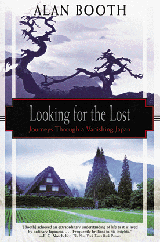GOLDSEA | ASIAN BOOKVIEW | NONFICTION
Looking for the Lostby Alan Booth
Kodansha Globe, New York, 1996, 387pp, $15
Journeys Through a Vanishing Japan
REVIEW: STOLEN SCENES
 t's the rare travel writer who transcends the form, who appreciates the fine detail of a land like the grain in a photo. Even rarer is the writer who brings the rhythm of a land to the eye and ear of the reader--particularly when the land is not the writer's own.
t's the rare travel writer who transcends the form, who appreciates the fine detail of a land like the grain in a photo. Even rarer is the writer who brings the rhythm of a land to the eye and ear of the reader--particularly when the land is not the writer's own.
Booth traveled by foot all through Japan's rural countryside and mountain villages, as though searching for himself amidst the quickly changing landscape. Here, he describes climbing a hilltop and coming upon what must be a town, but one without a name: "At the first of the passes stood a signboard showing the hot springs of the region, but the plywood had rotted and come apart in the rain leaving a gaping hole in the center of the board, so I literally stood in the middle of nowhere and all roads led to nowhere's end."
The chapter's title? "Home."
Alan Booth comes to rest full circle and we are the luckier for it. This is the final book by a great travel writer, completed just before his death from cancer in 1993 at the age of 46.
EXCERPT
 hrough the plate-glass windows of the ferry terminal the wind whipped the sea into thrashing grey porpoise-backs, and when I went to the lavatory and looked at myself in the mirror I was astonished to find my face a mess of dark purple splotches. Still, there was nothing to do except push on up the half-drowned coast, promising myself that I would fall into the first ryokan, or Japanese-style inn, that I came to and, for kilometer after kilometer, coming to none. The rustic villages of the urban imagination turned out to be an unbroken line of shabby suburban houses, occasionally interrupted by a shabbier beauty parlor or a dusty barber's shop that stank of pomade. Between the forestry museum and the municipal boundary I could have had a dozen haircuts and at least as many facelifts but I'd have had trouble finding a hot drink. I walked on the inland side of the road because of the fraction of shelter the squat houses gave me, but there was really no relief to be had. The rain clattered against the clear plastic doors of the Coca-Cola vending machines and hammered the cherry flowers that lay sodden along the pavements. At four o'clock, after about eighteen kilometers, I crossed out of the official limits of Aomori city into the little hamlet of Nakazawa, indistinguishable among the line of dowdy buildings that continued to stretch off to the limits of sight, escept that one of the buildings was a ryokan into which I did not so much fall as dissolve.
hrough the plate-glass windows of the ferry terminal the wind whipped the sea into thrashing grey porpoise-backs, and when I went to the lavatory and looked at myself in the mirror I was astonished to find my face a mess of dark purple splotches. Still, there was nothing to do except push on up the half-drowned coast, promising myself that I would fall into the first ryokan, or Japanese-style inn, that I came to and, for kilometer after kilometer, coming to none. The rustic villages of the urban imagination turned out to be an unbroken line of shabby suburban houses, occasionally interrupted by a shabbier beauty parlor or a dusty barber's shop that stank of pomade. Between the forestry museum and the municipal boundary I could have had a dozen haircuts and at least as many facelifts but I'd have had trouble finding a hot drink. I walked on the inland side of the road because of the fraction of shelter the squat houses gave me, but there was really no relief to be had. The rain clattered against the clear plastic doors of the Coca-Cola vending machines and hammered the cherry flowers that lay sodden along the pavements. At four o'clock, after about eighteen kilometers, I crossed out of the official limits of Aomori city into the little hamlet of Nakazawa, indistinguishable among the line of dowdy buildings that continued to stretch off to the limits of sight, escept that one of the buildings was a ryokan into which I did not so much fall as dissolve.

The ryokan was presided over by a grandmother in a blue cardigan who hung up my wet things, shooed me to the bath, found me a dry woolly kimono, smiled and nodded whenever I said anything and called me Sensei, a polite term of address used by pupils to their teachers, publishers to their authors, electors to their parliamentary representatives, bar hostesses to their best-heeled customers, people wishing to be facetious to those they particularly despise, and by the general public to anyone who appears, or professes, to know something that they do not.
"A foreigner from Australia came here once, Sensei, and brought his little foreign daughter. You should have seen them! Such lovely foreign skin! And once, when my husband and I went on a package tour of Macau, we met a foreign family there--English foreigners, I think they were--and, well, we just had to ask them to line up and let us take their photographs. I've never seen anyone look so lovely as those foreigners. And you've got a daughter, have you, Sensei? I bet she looks lovely too--like a regular E.T."
ASIAN AIR ISSUES FORUM |
CONTACT US
© 1999-2003 GoldSea
No part of the contents of this site may be reproduced without prior written permission.
